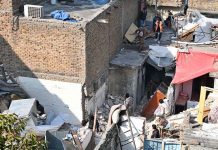Staff Report
ISLAMABAD: COMSATS University Islamabad (CUI), in collaboration with The Alliance for Just Deliberation on Solar Geoengineering (DSG), a US-based non-profit organization, successfully hosted a pivotal stakeholder engagement meeting to discuss the development and implications of a prototype Solar Radiation Modification (SRM) Impacts Dashboard for Malaria in South Asia at the district level.
It was funded by the Harvard University Center for International Development’s Global Empowerment Meeting (GEM) Incubation Fund, the event brought together 46 climate and health researchers, and health policy experts and practitioners from across Pakistan to explore SRM’s potential role in addressing climate-driven health challenges in one of the world’s most vulnerable regions.
The meeting featured a robust program of presentations, interactive discussion and feedback on a prototype dashboard that highlights district level data on future climate change, SRM and malaria.
The event facilitated thematic breakout sessions to continue bridging gaps in the climate-health nexus. The inclusion of SRM technologies into this nexus is adding a level of urgency to the climate action needed on public health, especially in the context of vector-borne diseases.
Breakout sessions encouraged stakeholders to share thematic perspectives, offering valuable insights into refining the SRM-Malaria Dashboard to better serve health policy frameworks.
Prof. Dr. Athar Hussain, Principal Investigator (PI) of several SRM research projects at CUI, emphasized the importance of collaborative research and interdisciplinary approaches in addressing climate change’s public health implications, particularly the changing dynamics of vector-borne diseases like malaria.
Mr. Hassaan Sipra, Director of Global Engagement at The Alliance for Just Deliberation on Solar Geoengineering (DSG) and a key contributor to the SRM research initiatives at CUI, discussed the global dimensions of SRM research and its ethical implications.
Dr. Abdul Waheed, Policy Analyst, addressed the socio-political complexities of SRM. “In the context of addressing climate-driven health challenges in South Asia, it is important to understand the social and political factors that may shape public acceptance or rejection of SRM within the health sector, and the ethical implications these technologies. By investing in research and tools today, we can help ensure that SRM strategies are developed and implemented in a way that aligns with ethical standards, addresses societal concerns, and supports effective governance frameworks in Pakistan, and provides a model of Global South outputs in this field.”
In addition to the prototype dashboard, CUI is also leading two initiatives assessing projected changes to climate variables, climate and health policies, and the evolving role of malaria control in emerging climate dynamics and public health sector of Pakistan and South Asia. Funded by The Degrees Initiative, a UK-based charity focused on increasing SRM research among Global South institutions, these works’ initial findings suggest that SRM technologies could have both beneficial and adverse effects on malaria transmission in the region. These insights will be critical for shaping future SRM research and policy development, ensuring that health systems are prepared for various potential outcomes, such as integration into public health strategies to mitigate climate-driven disease outbreaks in vulnerable communities.
CUI continues to work on SRM research, to strengthen Global South perspectives on these technologies. These issues require more resources, more dialogue, and more constructive actions. Activities such as this one is the crux of stakeholder engagement that can pave the way towards building public trust in the processes around decision making on SRM, while empowering Global South people and policy makers to address it within their local vulnerabilities and contexts.




